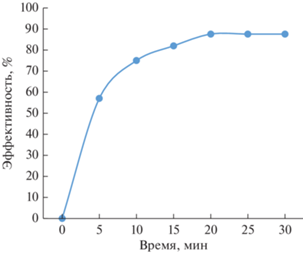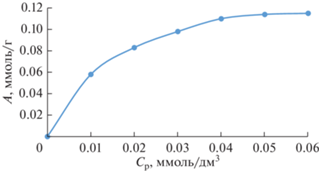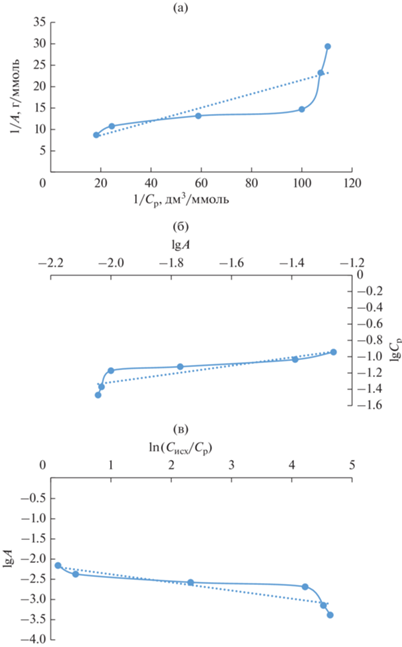Известия РАН. Серия биологическая, 2023, № 4, стр. 339-345
Физико-химические и сорбционные характеристики кутикулы куколок мухи Hermetia illucens
С. В. Свергузова 1, *, И. Г. Шайхиев 2, Ж. А. Сапронова 1, А. В. Святченко 1, Н. А. Ушакова 3
1 Белгородский технологический университет им. В.Г. Шухова
308012 Белгород, ул. Костюкова, 46, Россия
2 Казанский национальный исследовательский технологический университет
420015 Казань, ул. Карла Маркса, 68, Россия
3 Институт проблем экологии и эволюции им. А.Н. Северцова РАН
119071 Москва, Ленинский пр., 33, Россия
* E-mail: pe@intbel.ru
Поступила в редакцию 06.12.2022
После доработки 06.03.2023
Принята к публикации 06.03.2023
- EDN: TQCDDH
- DOI: 10.31857/S1026347022601047
Аннотация
Исследованы физико-химические свойства кутикулы куколок мухи черная львинка Hermetia illucens. Определен качественный и гранулометрический составы хитинового материала, методом сканирующей микроскопии изучен микрорельеф поверхности частиц хитина. С помощью метиленового голубого исследованы сорбционные свойства материала. Установлено, что сорбционная емкость материала составляет 0.118 ммоль/г или около 38 мг/г. Математическая обработка изотермы сорбции в рамках моделей Ленгмюра, Фрейндлиха, Дубинина–Радушкевича показала, что лучше всего процесс описывается моделью Дубинина–Радушкевича (R2 = 0.8031), а процесс сорбции имеет физическую природу (E = 5.534 кДж/моль).
Онтогенез насекомых, способных развиваться в чистой культуре, состав и физико-химические свойства их тканей являются объектом пристального внимания исследователей в связи с фундаментальными вопросами адаптации организма к условиям жизни, а также практической востребованностью продуктов переработки выращенной биомассы насекомых. Муха черная львинка Hermetia illucens широко используется в мировой практике для разведения в искусственных условиях и получению биомассы в промышленных масштабах, при этом особый интерес проявляется к тем органам и тканям насекомого, которые могут использоваться в качестве сырья для дальнейшей переработки. К их числу относится хитин кутикулы.
Муха H. illucens относится к насекомым с полным циклом развития, который включает стадию куколки, из которой затем вылетает взрослая муха. Кутикула куколки состоит в основном из комплекса хитина с белком. Известны сорбционные свойства хитина, в том числе и в отношении различных ксенобиотиков и избыточно поступающих металлов. Хитин содержит несколько функциональных групп – гидроксильные, карбонильные, амино-, ацетиламидные группы и кислородные мостики, поэтому механизм сорбции металлов этими полимерами имеет довольно сложный характер. В зависимости от условий он может включать комплексообразование, ионный обмен и поверхностную адсорбцию, однако большинство исследователей в последнее время склоняются к тому, что чаще всего преобладает хелатное комплексообразование, обусловленное высокой электронодонорной способностью атомов азота и кислорода. Благодаря этому хитиновые сорбенты обладают широким спектром сорбируемых элементов. Практически это ионы всех металлов, за исключением щелочных и щелочноземельных (Ahmed et. al., 2020; Sirajudheen et. al., 2021).
Основными источниками хитина являются раковины и панцири ракообразных. Однако перспективным также может быть получение хитина и хитозана из насекомых (Хайрова и др., 2018; Hahn et al., 2020; Mohan et al., 2020; Kumar et al., 2020). Показано, например, что из личинок Hermetia illucens возможно выделение хитина (Jayanegara et al., 2020; Monisha, Loganathan, 2021; Шайхиев и др., 2022). Содержание хитина в обезжиренных личинках черной львинки составило 18.22%, клетчатки – 9.29% (Monisha, Loganathan, 2021). Одним из путей использования хитина, в том числе и выделенного из биомассы мухи H. illucens, является применения в качестве пребиотиков (Строкова и др., 2018; Aroa et al., 2020). В этой связи представляло интерес исследовать хитин куколок мухи черная львинка на его сорбционные свойства для выявления теоретических основ биологического действия хитина.
МАТЕРИАЛЫ И МЕТОДЫ
В работе использовали сухую биомассу тонкоизмельченной хитинсодержащей кутикулы куколок (КК) мухи H. illucens, состав которой был изучен в соответствии с методиками и выражен в %: протеин – по ГОСТ 13496.4–2019, п.8; хитин по клетчатке – по ГОСТ 31675–2012; жир – по ГОСТ 13496.15–2016; содержание углеводов – безазотистых экстрактивных веществ определяли расчетным способом путем вычитания из 100% суммы вышеперечисленных компонетов.
Качественный состав функциональных групп хитина определялся методом ИК-Фурье спектроскопии с применением приставки нарушенного полного внутреннего отражения (НПВО). Исследование проводилось на ИК-Фурье спектрометре марки “Frontier” (Perkin Elmer).
Для разделения материала КК на фракции использовали стандартный набор сит ГОСТ 51568–99.
Изучение микрорельефа и энергодисперсионных спектров поверхности частиц хитина куколок проводилось с помощью сканирующего электронного микроскопа “TESCAN Mira 3 LMU” (Чехия).
Для исследования сорбционных свойств материала КК использовался краситель метиленовый голубой (МГ) как общепринятое стандартное вещество при определении сорбционной емкости. Растворы, содержащие МГ в заданных концентрациях, готовились путем растворения расчетной навески реактива в дистиллированной воде.
Адсорбционные исследования проводились в статических условиях. Использовался раствор МГ с исходной концентрацией 25 мг/дм3, объемом по 100 см3, который помещали в стеклянные колбы вместимостью 250 см3, куда добавляли навески материала КК заданной массы. Колбы с раствором МГ и навесками КК встряхивались на автоматическом шейкере в течение 24 ч при температуре 22 ± 0.1°C. Затем содержимое колб отфильтровывалось через бумажный фильтр, в фильтрате определялись остаточные концентрации МГ. Сорбционная емкость A, ммоль/дм3, рассчитывалась по формуле:
где Cн – начальная концентрация МГ, ммоль/дм3; Cр – равновесная концентрация МГ после адсорбции, ммоль/дм3; V – объем модельного раствора, дм3; m – масса сорбционного материала, г.
Изучение процесса адсорбции осуществлялось при температуре 22 ± 0.1°C.
Статистическую обработку данных осуществляли согласно ГОСТ Р 8.736–2011 “Государственная система обеспечения единства измерений (ГСИ). Измерения прямые многократные. Методы обработки результатов измерений. Основные положения”
РЕЗУЛЬТАТЫ И ОБСУЖДЕНИЕ
Кутикула куколок содержит белок и хитин практически в равных количествах, составляя 95% от всех компонентов. Суммарная доля жира и безазотистых экстрактивных углеводов не превышала 5% (табл. 1). Результат указывает на перспективность кутикулы куколок как источника хитина, который не требует специального обезжиривания для последующего выделения.
Таблица 1.
Состав кутикулы куколок H. illucens
| № | Показатель | Содержание, % |
|---|---|---|
| 1 | Протеин | 54.14 ± 1.83 |
| 2 | Хитин | 41.05 ± 2.97 |
| 3 | Жир | 2.49 ± 0.49 |
| 4 | Безазотистые экстрактивные вещества (в том числе углеводы) | 2.32 |
Высушенный и измельченный материал КК с помощью набора сит разделился на фракции: ∅ < < 0.25 мм; 0.25 < ∅ < 0.5 мм; 0.5 < ∅ < 1 мм. Путем взвешивания определенных объемов КК определился насыпной вес (ρнас) для каждой фракции (табл. 2).
Таблица 2.
Насыпной вес кутикулы куколок H. illucens
| № | Размер частиц фракции, мм | ρнас, г/см3 |
|---|---|---|
| 1 | ∅ < 0.25 мм | 0.362 |
| 2 | 0.5 < ∅ < 0.5 мм | 0.252 |
| 3 | 0.5 < ∅ < 1 мм | 0.223 |
Как видно из табл. 2, с повышением размера частиц, насыпной вес материала уменьшается, что объясняется меньшей плотностью упаковки частиц.
Качественный состав материала КК фракции <0.25 мм изучали методом ИК-спектроскопии.
На ИК-Фурье спектре (рис. 1) исследованного образца в области 3500–3100 см–1 присутствует широкая полоса, характерная для валентных колебаний гидроксильных групп. В области 3000–2800 см–1 имеются два пика, характерные для метильных и метиленовых групп. В области 1700–800 см–1 присутствуют полосы при 1643 см–1, характерные для N–H связи, 1543 см–1 для C=O-связи, полоса при 1378 см–1 соответствует сумме колебаний связей N–H и C–N в амидах. Полоса 1010 см–1 соотносится с валентными колебаниями C–O-связи.
Анализ полос в ИК-спектре полученного нами хитина из КК H. illucens показал сходство структуры хитина, полученного из личинок, куколок и имаго насекомого другими исследователями (Soetemans et al., 2020; Wang et al., 2020; Triunfo et al., 2022), что позволяет предположить его пригодность для промышленных и биомедицинских применений.
Также выявлено, что ИК-спектры хитинов, выделенных из панцирей креветок, водорослей и КК H. illucens, сопоставимы между собой (Coltelli et al., 2022). Сходную картину имеют ИК-спектры хитинов, полученных из личинок черной львинки, лосося атлантического, кальмара и панциря тигровой креветки (Brigode et al., 2020).
На рис. 2 показаны микрофотографии частиц сорбционного материала при разных увеличениях. Как видно из полученных данных, поверхность частиц сорбционного материала имеет высокоразвитую структуру, а его состав содержит множество элементов, таких, как Ca, Mn, P, C, O и др. (табл. 3). Основными элементами являлись углерод (в среднем 39.3%), кислород (в среднем 32.2%), а также кальций (в среднем 11%). Можно отметить, что по содержанию углерода и кислорода образцы разных участков кутикулы существенно не различались, что характерно для органической природы исследуемого материала, в то время как доля кальция различалась в два раза. Это, по-видимому, связано с особенностями структурной организации кутикулы, в которой Са располагается неравномерно по всей массе кутикулы, и локализован в зоне соединения между хитиновой и белковой фазами, которая включает соли кальция, обычно карбонаты в форме кальцита, для увеличения жесткости кутикулы (Vincent, Wegst, 2004).
Таблица 3.
Элементный состав кутикулу куколок H. illucens, %
| Название | C | O | Na | Mg | P | S | Cl | K | Ca | Mn |
|---|---|---|---|---|---|---|---|---|---|---|
| Участок 1 | 40.22 | 33.12 | 1.81 | 0.50 | 4.62 | 0.57 | 1.66 | 2.02 | 14.25 | 1.22 |
| Участок 2 | 38.96 | 31.35 | 12.09 | 0.29 | 4.69 | 0.56 | 2.12 | 1.70 | 7.74 | 0.50 |
Для проверки возможности использования хитинового материала для очистки водных сред использовался раствор метиленового голубого, как общепринятый стандарт при определении сорбционной емкости. Рациональная масса добавки составила 2 г/дм3, длительность взаимодействия модельного раствора и хитиновым сорбционным материалом – 20 мин (рис. 3, 4).
Рис. 3.
Влияние длительности взаимодействия модельного раствора с хитиновым сорбционным материалом на эффективность очистки.

Последующим этапом работы было определение расчетным путем удельной площади поверхности (Sуд) сорбционного материала. Для этого строилась изотерма адсорбции, представленная на рис. 5, которая по классификации ИЮПАК, относится к изотермам I типа и характеризует изотерму на микропористых твердых телах.
Рис. 5.
Изотерма адсорбции красителя метиленовый голубой на поверхности порошка хитиновых кутикул куколок H. illucens.

Значение Sуд исследуемого сорбционного материала рассчитывалось по формуле:
где A∞ = 0.118 ммоль/г; NA – число Авогадро, 6.02 × 1023 ммоль–1; Q – площадь поперечного сечения молекулы МГ, М = 319.85 г/моль.
Полученное значение Sуд составило 20.6 м2/г.
Изотерма адсорбции обработана методом регрессии с помощью программного обеспечения MATLAB в рамках моделей Ленгмюра, Фрейндлиха и Дубинина–Радушкевича (Галимова и др., 2016). Полученные результаты (рис. 6, табл. 4) позволяют утверждать, что адсорбция МГ материалом хитиновых КК черной львинки наиболее адекватно описывается моделью Дубинина–Радушкевича (R2 = 0.8031), которая описывает процесс адсорбции на твердых пористых адсорбентах, к которым можно отнести материал КК. Эта модель используется также для идентификации протекания физической или химической адсорбции, так как константа Дубинина–Радушкевича применяется для определения энергии адсорбции. По величине энергии сорбции (E) можно судить о природе взаимодействия между КК и активными центрами сорбционной поверхности, т.е. получить ответ на вопрос, является ли процесс закрепления МГ на поверхности сорбента физическим процессом, или он имеет химический характер. При E < 8 кДж/моль адсорбция носит физический характер, а при E от 40 кДж/моль и выше – химический.
Рис. 6.
Изотермы адсорбции, обработанные в рамках моделей: а) Ленгмюра, б) Фрейндлиха, в) Дубинина–Радушкевича.

Таблица 4.
Уравнения изотерм адсорбции МГ сорбционным материалом
| № | Уравнение модели | Уравнение процесса | Коэффициент корреляции |
|---|---|---|---|
| 1 | Ленгмюра $\frac{1}{A} = ~\frac{1}{{{{A}_{\infty }}}} + \frac{1}{{{{K}_{L}}{{A}_{\infty }}{{C}_{{\text{p}}}}}}$ |
y = 0.1614x + 5.3835 | 0.7176 |
| 2 | Фрейндлиха lg A = lg KF + 1/n lg Cp |
y = 0.5077x – 0.2944 | 0.7662 |
| 3 | Дубинина-Радушкевича $\ln A = \ln {{A}_{\infty }} - {\text{\;}}{{\left( {\frac{{RT}}{E}} \right)}^{2}}{{\left( {\ln \frac{{{{C}_{{\text{н}}}}}}{{{{C}_{{\text{p}}}}}}} \right)}^{2}}$ |
y = –0.2004x – 2.1795 | 0.8031 |
В нашем случае значение E = 5.534 кДж/моль, поэтому следует утверждать, что в данном случае имеет место физический процесс адсорбции.
ЗАКЛЮЧЕНИЕ
Исследованы некоторые физико-химические свойства хитина, выделенного из кутикулы куколок мухи H. illucens. Определен качественный и гранулометрический составы полученного хитина, а также изучен микрорельеф поверхности последнего. Исследованы сорбционные свойства материала на примере красителя метиленового голубого. Установлено, что сорбционная емкость материала составляет 0.118 ммоль/г (38 мг/г). Математическая обработка изотермы сорбции в рамках моделей Ленгмюра, Фрейндлиха, Дубинина–Радушкевича, показала, что лучше всего процесс описывается моделью Дубинина–Радушкевича (R2 = 0.8031), а процесс адсорбции имеет физическую природу (E = 5.534 кДж/моль). Полученные данные свидетельствуют о возможности доставки пробиотиков, сорбированных на поверхности хитина силами физической адсорбции, в организм-реципиент, где, благодаря, слабой энергии сорбционного взаимодействия пробиотики освобождаются и вступают в биохимический круговорот веществ в организме, а хитиновая часть принимает участие в моторике кишечника.
Работа выполнена в рамках реализации федеральной программы поддержки университетов “Приоритет 2030” с использованием оборудования на базе Центра высоких технологий БГТУ им. В.Г. Шухова.
Список литературы
Галимова Р.З., Шайхиев И.Г., Алмазова Г.А., Свергузова С.В. Исследование кинетики процессов адсорбции фенола отходами валяльно-войлочного производства // Вестник БГТУ им. В.Г. Шухова. 2016. № 10. С. 179–184.
Строкова Н.Г., Подкорытова А.В. Современные способы переработки хитинсодержащего сырья // Труды ВНИРО. 2018. Т. 170. С. 124–152
Хайрова А.Ш., Лопатин С.А., Синицына О.А., Синицын А.П., Варламов В.П. Получение хитина из черной львинки Hermetia illucens путем прямой экстракции // Известия Уфимского научного центра РАН. 2018. № 3(2). С. 84–88. https://doi.org/10.31040/2222-8349-2018-2-3-84-87
Шайхиев И.Г., Свергузова С.В., Ушакова Н.А., Сапронова Ж.А., Воронина Ю.С. Хитин и хитозан из личинок Hermetia illucens: получение, свойства и перспективы использования // Экономика строительства и природопользования. 2022. № 3(84). С. 138–148.
Ahmed M.J., Hameed B.H., Hummadi E.H. Review on recent progress in chitosan/chitin-carbonaceous material composites for the adsorption of water pollutants // Carbohydrate polymers. 2020. V. 247. № 116690. P. 1–18. https://doi.org/10.1016/j.carbpol.2020.116690
Aroa L.-S. Mondragon A.C., Lamas A. Animal-origin prebiotics based on chitin: an alternative for the future? A critical review // Foods. 2020. V. 9. P. 1–20. https://doi.org/10.3390/foods9060782
Brigode C., Hobbi P., Jafari H. Isolation and physicochemical properties of chitin polymer from insect farm side stream as a new source of renewable biopolymer // J. Cleaner Production. 2020. V. 275. № 122924. P. 1–9. https://doi.org/10.1016/j.jclepro.2020.122924
Coltelli M.-B., Panariello L., Vannozzi A. Chitin and its derivatives: nanostructured materials from different marine and terrestrial sources // Chemical Engineering Transactions. 2022. V. 93. P. 295–300. https://doi.org/10.3303/CET2293050
Hahn T., Tafi E., Paul A. Current state of chitin purification and chitosan production from insects // Journal of Chemical Technology & Biotechnology. 2020. V. 95. № 11. P. 2775–2795. https://doi.org/10.1002/jctb.6533
Jayanegara A., Haryati R.P., Nafisah A. Derivatization of chitin and chitosan from Black soldier fly (Hermetia illucens) and their use as feed additives: An in vitro study // Advanced in Animal and Veterinary Sciences. 2020. V. 8. № 5. P. 472–477. https://doi.org/10.17582/journal.aavs/2020/8.5.472.477
Kumar M. Insect chitin and chitosan: structure, properties, production, and implementation prospective / M. Kumar, V. Vivekanand, N. Pareek // Natural Materials and Products from Insects: Chemistry and Applications / Eds. Kumar D., Shahid M.: Springer Nature Switzerland AG, 2020. P. 51–66. https://doi.org/10.1007/978-3-030-36610-0_4
Mohan K., Ganesan A.R., Muralisankar T. Recent insights into the extraction, characterization, and bioactivities of chitin and chitosan from insects // Trends in Food Science & Technology. 2020. V. 105. P. 17–42. https://doi.org/10.1016/j.tifs.2020.08.016
Monisha C., Loganathan M. Impact of drying methods on the physicochemical properties and nutritional composition of defatted black soldier fly (Hermetia illucens) pre-pupae flour // Journal of Food Processing and Preservation. 2021. P. 1–10. https://doi.org/10.1111/jfpp.16184
Sirajudheen P., Poovathumkuzhi N.C., Vigneshwaran S. Applications of chitin and chitosan based biomaterials for the adsorptive removal of textile dyes from water – A comprehensive review // Carbohydrate Polymers. 2021. V. 273. № 118604. P. 1–40. https://doi.org/10.1016/j.carbpol.2021.118604
Soetemans L., Uyttebroek M., Bastiaens L. Characteristics of chitin extracted from black soldier fly in different life stages // International J. Biological Macromolecules. 2020. V. 165. P. 3206–3214. https://doi.org/10.1016/j.ijbiomac.2020.11.041
Triunfo M., Tafi E., Guarnieri A. Characterization of chitin and chitosan derived from Hermetia illucens, a further step in a circular economy process // Scientific Reports. 2022. V. 12. № 6613. P. 1–17. https://doi.org/10.1038/s41598-022-10423-5
Vincent J.F.V., Wegst U.G.K. Design and mechanical properties of insect cuticle // Arthropod Structure & Development. 2004 V. 33. P. 187–199. https://doi.org/10.1016/j.asd.2004.05.006
Wang H., Rehman K., Feng W. Physicochemical structure of chitin in the developing stages of black soldier fly // International J. Biological Macromolecules. 2020. V. 149. P. 901–907. https://doi.org/10.1016/j.ijbiomac.2020.01.293
Дополнительные материалы отсутствуют.
Инструменты
Известия РАН. Серия биологическая





